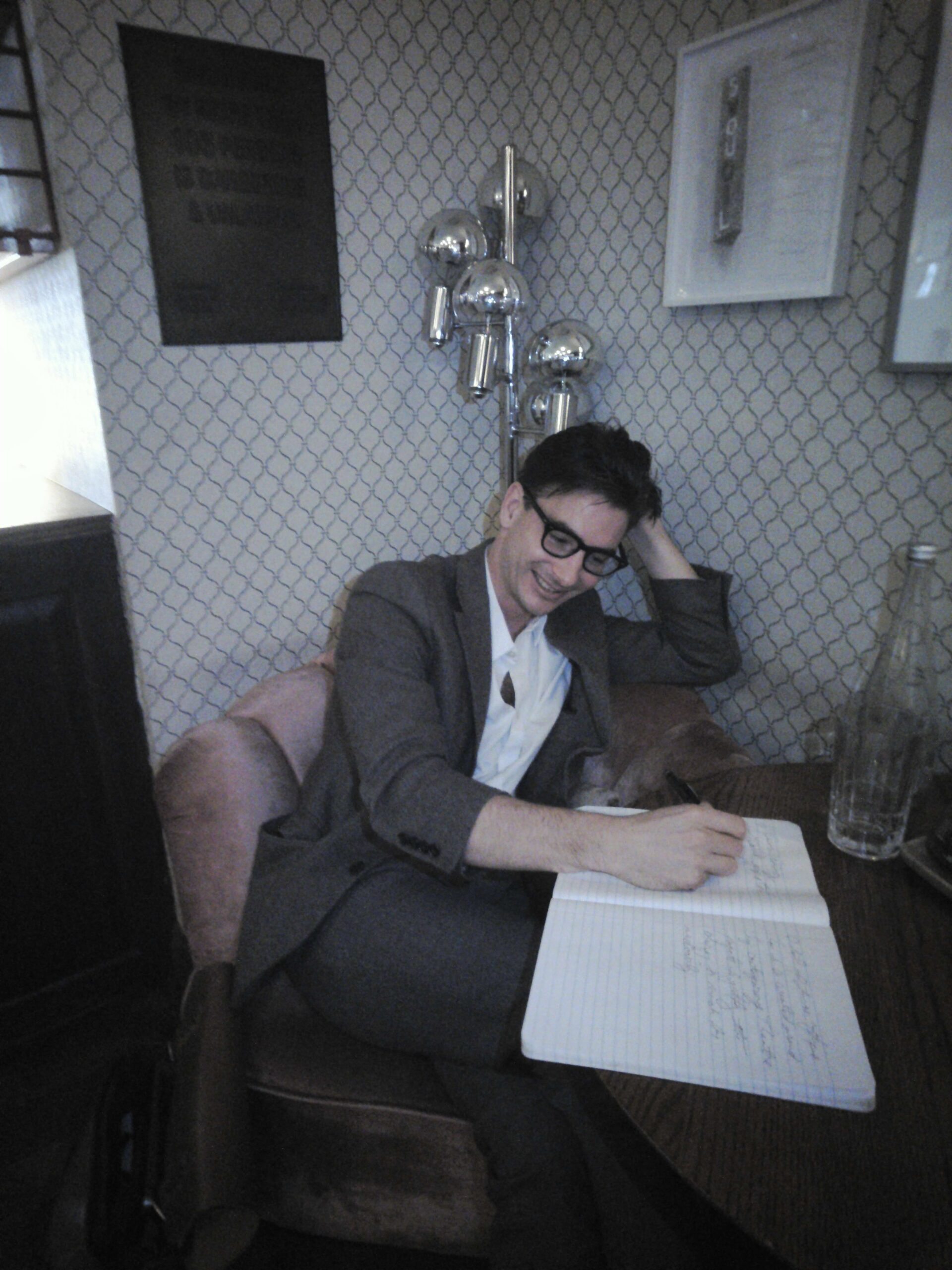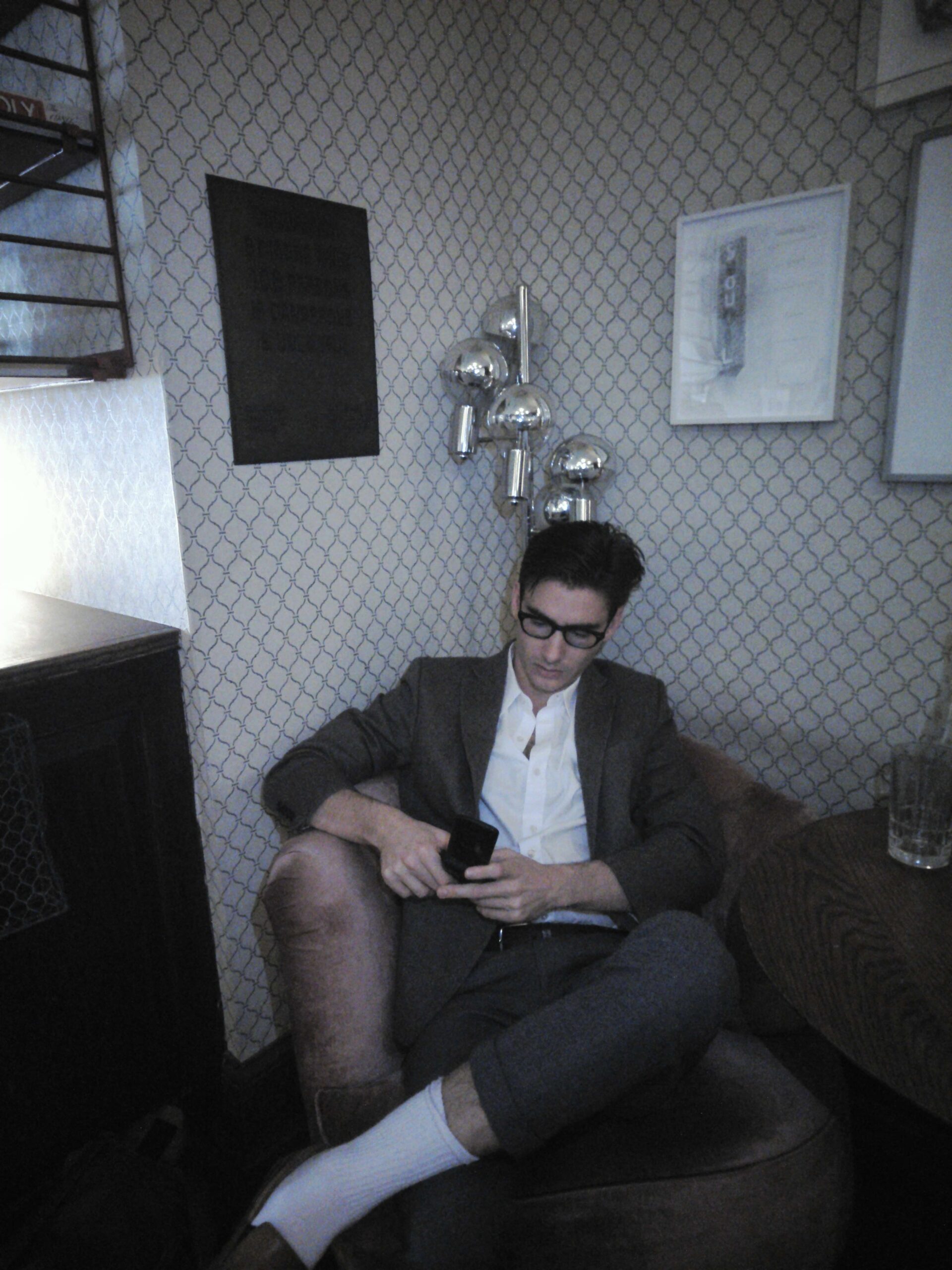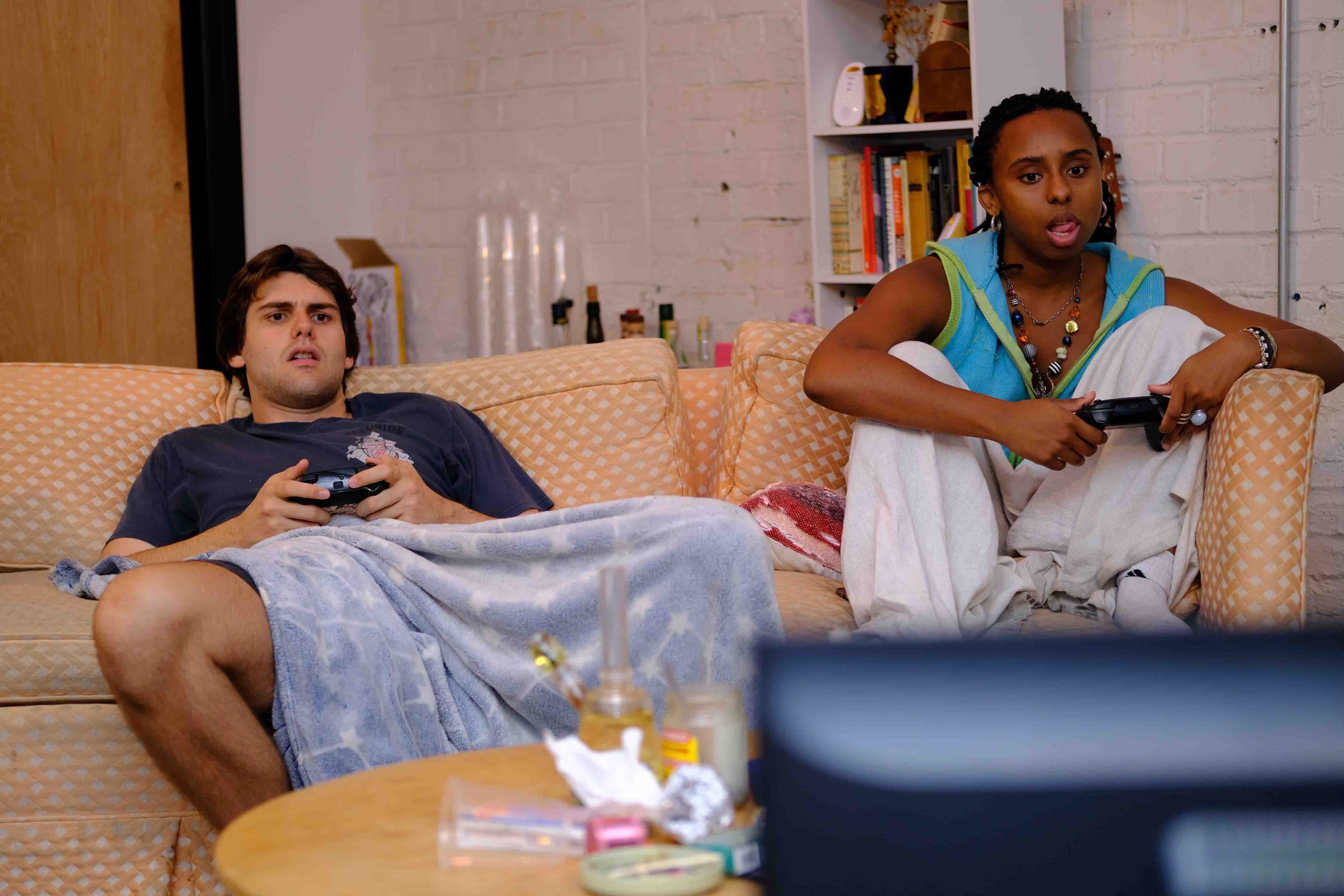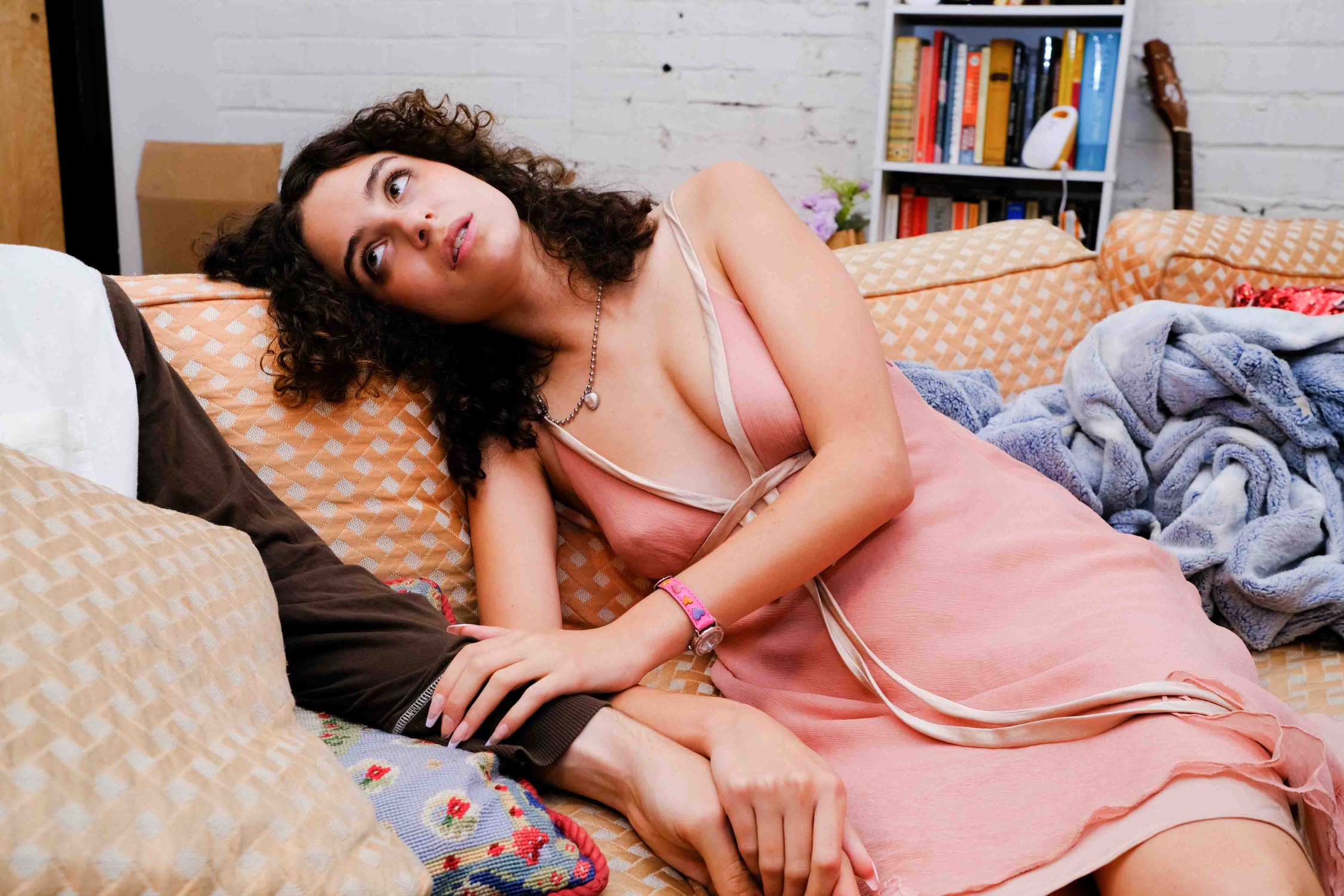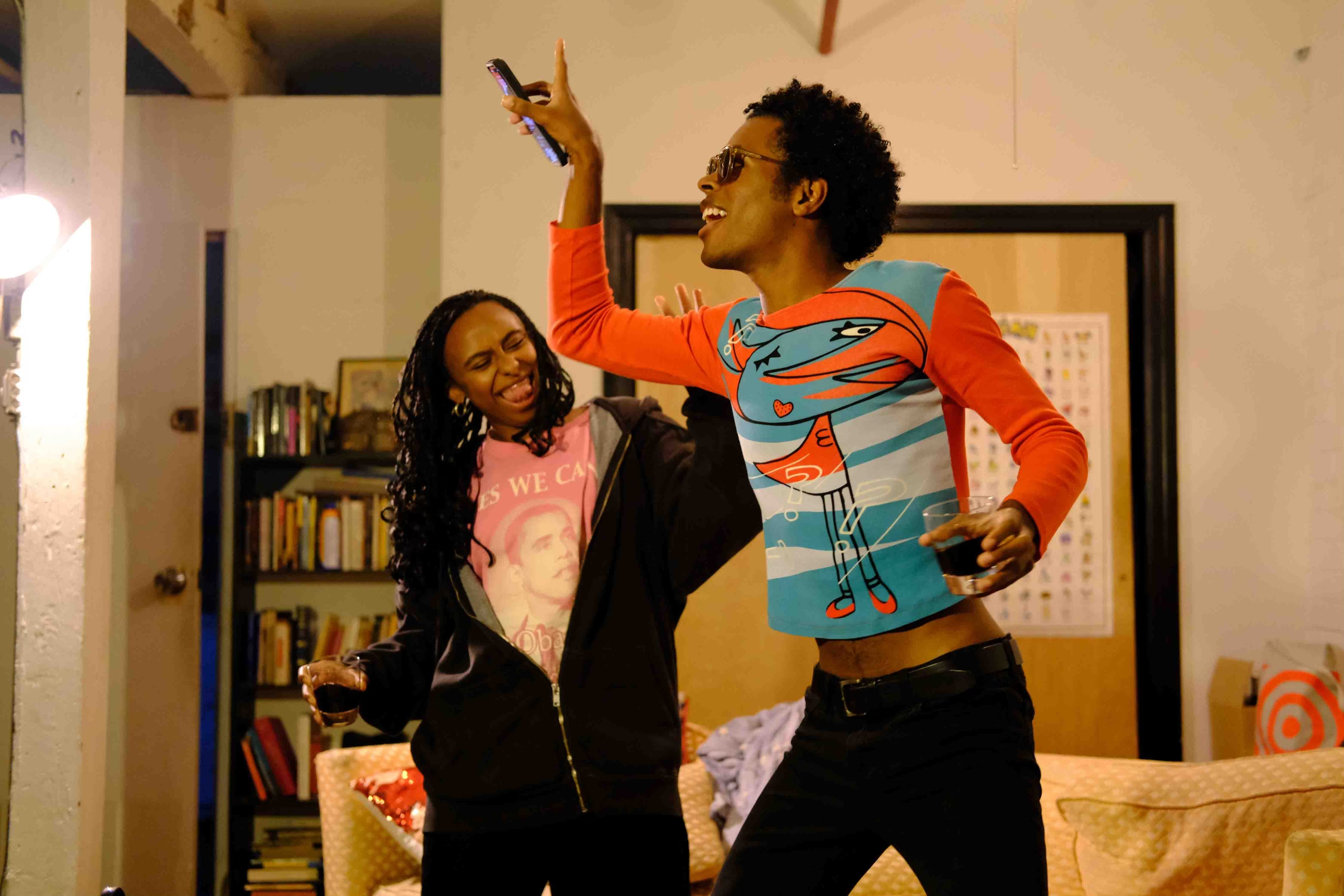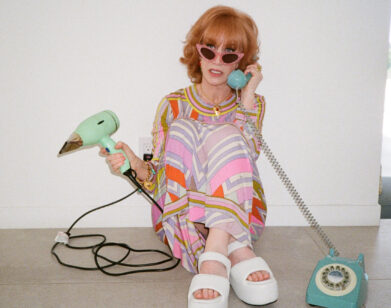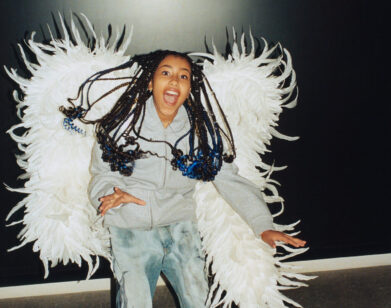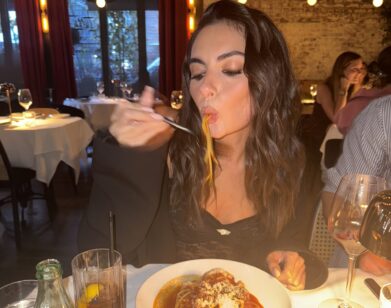PLAYWRIGHT
“It’s More Dangerous Than Therapy”: Matt Gasda and Harry Hill Talk Zoomers
No contemporary, local playwright makes you squirm in your seat like Matt Gasda. The latest of his hyper-specific living room plays, Zoomers, is about just that, specifically Bushwick zoomers, a subculture so easy to target they should be wary of rogue bows and arrows as they wait for the L train at Myrtle-Wyckoff, Elf Bar in hand. With his signature winding dialogue, delivered by characters so recognizable they border on annoying, Gasda examines this particular niche with a fine tooth comb, just as he did in last year’s Dimes Square, which cemented him as the foremost playwright amongst the Red Scare set. Like, Wait, how do you know the girl I used to live with and why have I literally had this exact conversation before? It’s tempting to get up onstage—though there is no stage, just a loft-like space consisting of a couch, a few chairs, and a coffee table—and interject, try and move things along. But ultimately, it’s more fun to watch.
I met Gasda back in the late 2010s when he was dating one of my friends, his “muse” at the time—how very Picasso! I got used to seeing him around, a strange man with antiquated mannerisms (he uses a flip phone and drinks raw milk). If being gay is one of my personality traits, being relatively unplugged is one of Gasda’s. So, when I was asked to interview him, it only felt right to bring him to Ludlow House, where I found him a little bit flustered in the lobby, wearing one of his signature wool blazers. It occurred to me that I don’t think I’ve ever seen him not wearing a blazer, and I’m not sure I’d recognize him in anything else. Gasda, 34, looks like someone drew Mark Ronson from memory; he’s handsome in a laid back way, with a scholarly sort of gait. As we ascended the stairs looking for a place quiet enough to talk, he compared the social club to an anthill, noting its many layers, and one might say the same of the milieus he opts to write about. In pink scalloped armchairs, as a pop star interviewed her new manager one table over, we discussed, in no particular order: Generation Z, sports betting, being online, being offline, muses, micro-fame, Taylor Swift, bisexuality, Erewhon, and Kim Kardashian.
———
HARRY HILL: An influencer and a playwright walk into Ludlow House. What could go wrong?
MATT GASDA: Everything.
HILL: Matt, how are you?
GASDA: Good. I was up until like 5:30 writing. Then I woke up to a phone call and I was like “Oh, got to go.”
HILL: Who was on the phone?
GASDA: My girlfriend.
HILL: Who’s in the play.
GASDA: Who’s in the play, yes.
HILL: We’re going to get to that. So you’ve written another hyper-specific living room play, this one about a bunch of Gen Z roommates going through all the drama of being in your early twenties and living in a little apartment together. What made you want to investigate Gen Z in all its anxious glory?
GASDA: A lot of things, I think. I’ve been a teacher and tutor for 10 years and I enjoy tutoring and I work with teenagers. A lot of my afternoons are spent talking to younger people, who I guess might not even be Gen Z anymore, but the principle remains. And in theater, there’s always a fresh crop of younger people who are interested, so I write for people that I want to work with. And I’ve realized their version of youth is different from mine.
HILL: On TikTok, I keep seeing teachers complaining that kids these days can’t read or write. Are you running into that as a teacher?
GASDA: Yes and no. As a private tutor in New York, you’re working with kids who go to extremely good schools. But there’s definitely a massive crisis, and we’ll be experiencing the effects of that in the next 30 years.
HILL: Your play is called Zoomers. I was looking up the years that Zoomerism encompasses. It’s 1997 to 2012. So we’re both millennials, correct?
GASDA: Yes. I was born in 1989.
HILL: Okay, cool. I’m ’94. Would you consider me cusp?
GASDA: You are culturally zoomer but cognitively millennial.
HILL: Okay. Do you feel like playwrights and influencers are similar?
GASDA: Well, you have to be a social observer and you have to observe trends. You’re like an amateur sociologist and anthropologist.
HILL: Tea. I’m going to put that on my resume.
GASDA: You should.
HILL: So you use a flip phone. You’ve used a flip phone for as long as I’ve known you. You look like you stepped out of a different time. Is it hard to maintain this kind of antiquated pose while writing something that is so current and so topical?
GASDA: Yeah, it is hard.
HILL: Do you hide an iPhone under your mattress?
GASDA: I don’t.
HILL: Interesting.
GASDA: I have one old iPad, which I use to dictate. But I don’t have WiFi in my apartment.
HILL: Do you have electricity?
GASDA: Yes. I mean, it’s a pose in some ways because it’s a way of maintaining my sense of difference with reality. But I’ll say this: I’m just as prone to the internet. I’m just as online as most people. I just set up boundaries, which is mainly that I have to be connected to WiFi to get access to it.
HILL: The way that the characters speak in Zoomers would suggest that you are very, very online.
GASDA: I’m not on TikTok, but a lot of TikToks get posted to X.
HILL: That’s true. What would you say is the defining characteristic of a Zoomer?
GASDA: Well, the play is like a computer in that it’s still processing it for me. My style’s kind of stayed the same, but I think my new approach, to some degree, has been to take a topic that makes people roll their eyes. Dimes Square, Berlin, Zoomer culture, online culture. It’s like setting up a pop-up shop, and then people come to you with data.
HILL: Crowdsourcing.
GASDA: Yeah, crowdsourcing. I really listened to people who I’ve been working with. And we had three public readings, which also provided a lot of information. Also, I announced on the internet that I was writing the play and then, all of a sudden, people DM me or pull me aside and say, “Here’s how I think about this.'” Even now, there was this one younger, computer programmer who just posted a 2,000-word essay on his personal website not really attacking the play, but being like, “He doesn’t understand Zoomer culture, [so] I’m going to write my own play.” And, “You chose an old Chekhovian form, which is outdated.” We’ll see if this guy writes a new play.
HILL: You’re kind of like the Chekhov of people that ride the G train.
GASDA: That’s so funny.
HILL: Do you write the characters for specific actors?
GASDA: Yes, at first. But if they leave the project, then it’s open season.
HILL: After I saw Zoomers, I turned around and you were kissing one of the actresses from the show.
GASDA: Yes, my girlfriend.
HILL: Do you always have lovers attached to your projects?
GASDA: No. I just spend most of my time doing the plays, so it’s sort of not possible to have a sustained relationship with someone who’s not interested in theater.
HILL: It’s like dating a coworker.
GASDA: No, it’s much more intentional, in the sense that when I’m inspired by someone, I want to write for them. But I also write for friends.
HILL: You wrote a character that resembles yourself, someone who drinks raw milk and wears similar clothing to you and is a little older than the rest of the cast.
GASDA: The millennial architect.
HILL: He’s based on you, correct?
GASDA: Yeah, to some degree. I’m very willing to put in material from my own life if it makes the play better, but I also put things in there that are complete fabrications. In that particular scene you’re talking about, I was thinking about my own relationship dynamics and my own reflections on getting older and the difficulty of having any relationship. But at the end of the day, it’s a play. You use the best material you have at hand. Nothing in the play is a transcription of real life, but it is a reflection on things that I’ve thought about and experienced.
HILL: Is it therapeutic?
GASDA: I think it’s more dangerous than therapy.
HILL: Is it kinky?
GASDA: It’s not kinky, no. It’s not a fetish and it’s not therapy. It’s art. You’re trying to get to the truth of something. You’re trying to assess your own bullshit. You’re trying to assess the bullshit in the world around you, too. You’re trying to make sense of things that scare you or make you anxious, things you regret, things you love, people you love. My goal is to write the best play I can write. But even if I don’t write something that’s autobiographical, it’s going to be interpreted as auto-fiction. So it’s damned if you do, damned if you don’t. But really, it’s all about pursuit of the truth.
HILL: There’s a gay plot line in Zoomers. Speaking as a gay guy myself, it’s pretty accurately portrayed.
GASDA: Again, I just try to treat things objectively. It’s not truly objective, obviously, but it’s a way of letting your imagination be ambidextrous and bisexual. As a playwright, or any kind of artist, it’s your job to not be afraid of internalizing ways of life and modes of sexuality and modes of intimacy that you haven’t experienced yourself, or whatever.
HILL: Did you just say that you were bisexual?
GASDA: No. But the point is, you have to be completely open, imaginatively. You have to be able to slip into someone else’s skin and then retain your own personality at the end of the process.
HILL: So the door of bisexuality is cracked, always.
GASDA: For theater, yes. Theater is polymorphous in that way. And I think that’s why people get really angry at the theater, really. That’s why there’s a response to my plays, I think.
HILL: Your shows are so intimate. Is that by design?
GASDA: It wasn’t, at first. I never had budgets. We have more resources now, but I never had money to create distance. To create distance in the theater, you need to pay for a big space. So it became a way of turning a weakness into a strength. I can only rent these small rooms, so how are people going to get their money’s worth out of this experience? But I think the value I’ve learned from people is in the discomfort. It’s also what I’m interested in artistically.
HILL: You’re kind of a character yourself, honestly. When you show up before the show, you command the audience and tell them to be engaged.
GASDA: I enjoy meeting people and I enjoy putting on plays. Obviously, I wouldn’t do it a hundred nights a year, and I’d be happy if I could remove my personality and my persona from the process entirely. I would be a less anxious person if I was anonymous. I’m sure you have your own anxieties about the gap between Harry Hill, the digital person, and Harry Hill, the man. We have to sell a version of ourselves in order to do the thing we love. Do I love that people notice that there are characters in the plays who might resemble me? No, I don’t love that. I would be much happier if people thought I was a 77-year-old nun.
HILL: If Dimes Square was about Dimes Square, where is Zoomers located?
GASDA: They definitely live off Myrtle-Wyckoff.
HILL: There’s a character that I thought was an influencer because she walked on stage carrying a Susan Alexandra handbag.
GASDA: See, I don’t even know what that is. They dress themselves.
HILL: You managed to write a show about Gen Z without leaning explicitly into identity politics. Was it tempting to write toward the characters’ identities, though?
GASDA: Well, there’s an indirect reference at the end of the third scene where Jada’s character says, “There are all these things I can’t talk about, and no one lets me talk about them, but I’m getting kind of angry.” That’s paraphrased. It’s something the cast and I talked a lot about. But I think there’s so many terms that if you put them in a play, the whole play becomes terms, and less about what the people are experiencing as people. I’m basically a humanist. I’m trying to say that, underneath these labels, people are operating on a sort of equal basis. Maybe not a fair basis, but they’re all having deeply human experiences within their brackets. If you look closely, there are a couple acknowledgements of their obsession with identity, or the fact that they’re forced to think in terms of identity, but they’re also resisting them. I think the internet is so dominated by a certain kind of language of personal identity, and people want to come to a play to see another dimension of being a human being today. It’s definitely something we thought about deeply as a group. But like I said, the play is sort of an experiment in itself, so it’s possible that a future version of the play, or a future play in general, might take a different stance.
HILL: If you were given one million dollars to put one of your plays on Broadway but you had to cast a famous influencer, would you do it?
GASDA: Of course. And for the record, I’ve cast people who’ve never acted before. I really believe that acting is a universal thing.
HILL: What would you do if Kim Kardashian emailed you and said, “Hey, Matt. I am a fan. I would love to be in one of your plays.”
GASDA: I would say the same thing I say for everyone. “Let’s get coffee. Tell me about your life and I’ll write a character for you. And we also need way more security.”
HILL: Maybe that play will be called Calabasas.
GASDA: I’ve been to Calabasas!
HILL: Have you ever been to Erewhon?
GASDA: No. What’s Erewhon?
HILL: It’s this crazy grocery store that’s also beautiful.
GASDA: I think I have gone there, actually.
HILL: Do you find there’s a difference between lover and muse?
GASDA: Of course. A muse is a much rarer thing.
HILL: Do you have a muse right now?
GASDA: Yeah. Sophia, for sure.
HILL: Was she a muse for this show?
GASDA: Yeah. We really love each other. I think we’re probably going to get married. So actually, that’s a big reveal.
HILL: Wow. Congratulations.
GASDA: Muses can be anyone. I think a muse is ultimately anyone who you feel like, “If I don’t write a role for you…”
HILL: It’s going to get away, somehow. Like you need to bottle it up. Do you vape?
GASDA: No. I’ve never smoked a cigarette, famously.
HILL: And you’ve never smoked a little juul pod?
GASDA: Never. It smells terrible. It smells like cancer.
HILL: There’s Elf Bars all over the signage for the show.
GASDA: People have come to me and said, “You need to have more vaping in the show.”
HILL: What would you say is your biggest vice?
GASDA: Probably sports gambling. I was gambling too much last year.
HILL: Matt Gasda is a sports bettor.
GASDA: Last year, I made a few thousand dollars and then basically lost it in a night. The thing is, I was very, very stressed by this kind of newfound micro-fame and that put a lot of pressure on me. So sports betting was like, “Okay, this is a different kind of pressure, but at least it’s disconnected from my reality. I’ll feel this anxiety rather than this personal anxiety.” Also, I do love sports.
HILL: So when Dimes Square blew up, you got that big New York Times feature. Do you get recognized?
GASDA: There are a couple of bars where, once in a while, someone will [recognize me]l. Most of the time it’s actually just people who have seen plays. That’s not really what gets to me. It’s more people on the internet, being in memes and getting trolled. The internet is actually a scary place and there are unstable people who will latch onto you. I always did this very intimate, somewhat exposing kind of theater into which I put all my insecurities and doubts and fears. When no one was paying attention, that didn’t seem stressful. But then, when people are paying attention, you’re like, “Oh my god, what have I done to myself?”
HILL: Who do you think is the reigning cultural saint of Generation Z?
GASDA: Oh, shit.
HILL: I feel like it’s an easy answer.
GASDA: What’s your answer?
HILL: Do you like Taylor Swift?
GASDA: Isn’t she the queen of millennials?
HILL: Well, she’s re-recording her albums.
GASDA: Yeah. She’s so dominant. She’s just become this global empire. The monoculture is back.
HILL: Do you ever listen to her?
GASDA: When other people play her, which is regularly. We have Taylor Swift albums in the theater space.
HILL: Have you ever bet on Travis Kelce?
GASDA: I’ve stayed away from all that, because all the betting apps now offer these parlays based on their relationship.
HILL: You’re not taking the bait.
GASDA: I’m not taking the bait.
HILL: Last question. How would you describe Gen Z in one word?
GASDA: Simultaneous.
HILL: Interesting.Well, I’m glad that we got to hang out at Ludlow House. Would you come back here?
GASDA: If there’s a world in which I’m a member, I could come and hang out.
HILL: There’s WiFi here.

